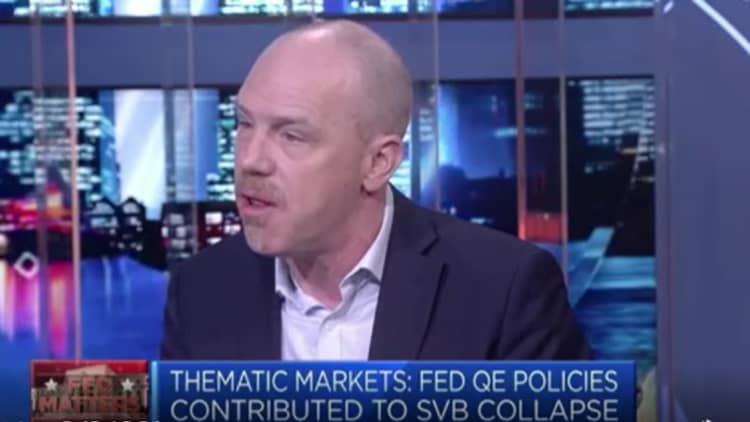
Chair of the ECB Supervisory Board Andrea Enria and Chairperson of the European Banking Authority (EBA) Jose Manuel Campa in the European Parliament on March 21, 2023.
Thierry Monasse | Getty Images News | Getty Images
U.S. regulators made mistakes in failing to prevent the collapse of Silicon Valley Bank and other financial institutions, according to lawmakers in the European Union who believe this is also a moment for some self-assessment in Europe.
Silvergate Capital, a bank focused on cryptocurrency, was the first to fall, saying March 8 that it would be ceasing operations. Shortly after, Silicon Valley Bank failed after a run on deposits. Signature Bank, which focused on lending to real estate firms, then saw deposit outflows leading regulators to seize the bank to prevent contagion across the sector.
Since then, First Republic Bank has also received support from other banks amid fears of a wider shock to the financial system. And in Switzerland, a non-member of the European Union, authorities had to rescue Credit Suisse by asking UBS to step in with an acquisition.
Meanwhile, regulators and officials across the European Union have been nervous about potential contagion to their own banking sector. After all, it’s not been that long since European banks were in the depths of the global financial crisis.
“There is no direct read across of U.S. events to [the] euro area significant banks,” Andrea Enria, chair of the European Central Bank’s supervisory board, said Tuesday. Like him, an array of officials have made an effort to stress that the European banking system is in much better share compared to 2008.
The U.S. lacks some controls.
Paul Tang
Lawmaker in the European Parliament
This reinforces the view in the EU that the U.S. should learn from some of the regulatory works put in place in the euro area since the financial crisis.
“You need stronger regulation … in that sense the U.S. lacks some controls,” Paul Tang, a lawmaker and a member of the European Parliament’s economic committee, told CNBC.
When asked if U.S. regulators made some mistakes, thus failing to prevent the recent banking turmoil, he said: “I definitely think so, you need to have scrutiny. That was the message from 2008.”
In the heart of European policymaking, in Brussels, an official, who did not want to be named due to the politically sensitive nature of the topic, told CNBC that several meetings between EU officials in recent days “stressed the failures of regulation [in the U.S.] particularly when compared with the EU.”
One of the key differences is that the U.S. has a more relaxed set of capital rules for smaller banks.
“The main difference is the Basel III requirements,” Stéphanie Yon-Courtin, a member of the European Parliament told CNBC. “These banking rules,” she said, “apply to very few banks — this is where the problem lays.”

Basel III is a set of reforms that strengthens the supervision and risk management of banks and has been developed since 2008.
It applies to most European banks, but American lenders with a balance sheet below $250 billion do not have to follow them.
‘Remain vigilant’
Despite some of the criticism toward American regulators, the EU recognizes this is not the time to be complacent. “We have to remain vigilant,” Yon-Courtin said. “We have to be careful and ensure these rules are still fit for purpose,” she added, pushing for a constant monitoring of the rulebook.
One of the main discussions in the EU in recent days has actually been the need to improve the European Banking Union — a set of laws introduced in 2014 to make European banks more robust.
The debate has been politically sensitive, but the reality that high interest rates are here to stay has made it even more important.
“We are well aware that the ongoing fast pace normalization of monetary policy conditions is increasing our banks’ exposure to interest rate risk,” Enria, the chair of the ECB’s supervisory board, said Tuesday.
